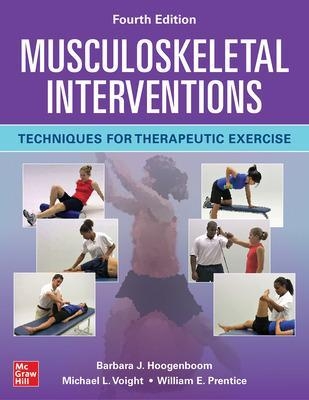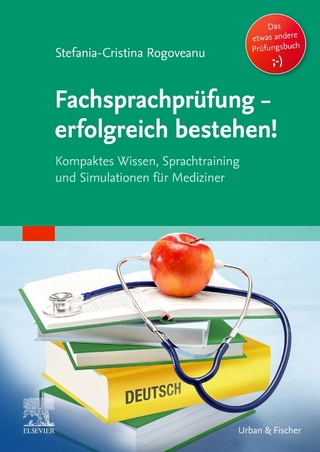
Musculoskeletal Interventions: Techniques for Therapeutic Exercise, Fourth Edition
McGraw-Hill Education (Verlag)
978-1-260-45995-1 (ISBN)
Written and edited by top experts in their fields, Musculoskeletal Interventions provides the rehabilitation techniques, strategies, and considerations you need to effectively treat patients of all ages, abilities, and functional levels. With expanded coverage of movement systems, along with clinical pearls and hundreds of illustrations, this edition has been fully revised to reflect a contemporary movement system approach patient care. It focuses on the practical application of theory in a clinical setting, making it ideal for students and experienced physical therapists alike. Designed to make finding what you need quickly and easily, Musculoskeletal Interventions is organized into five sections:
Foundations of the Rehabilitation Process
Introduces the human movement system, the Guide to Physical Therapist Practice, and the clinical reasoning process
Provides grounding on tissue healing, the Neuromuscular Scan Examination, pain, posture, and function
Treating Physiologic Impairments During Rehabilitation
Details general impairments that require attention throughout the rehabilitation process
Covers muscle performance, endurance and aerobic capacity, mobility, range of motion, and neuromuscular control
Tools of Rehabilitation
Explains how to achieve optimal outcomes using various tools, including plyometric exercise, open- and closed-kinetic chain interventions, proprioceptive neuromuscular facilitation techniques, joint mobilization, postural stability and balance interventions, core stabilization training, aquatic therapy, functional movement screening, and more
Interventions Strategies for Specific Regions
Describes applications of techniques and interventions related to common movement-based, overuse, traumatic, and postoperative musculoskeletal dysfunction
Provides guidance on conditions common to the shoulder complex, elbow, wrist, hand, digits, groin, hip, thigh, knee, lower leg, ankle, foot, and spine
Discusses pathomechanics and injury mechanisms while focusing on rehabilitation strategies and concerns for specific injuries and providing example protocols
Special Considerations for Specific Patient Populations
Provides application of all previous intervention strategies and how these may need to be selected, adapted, and utilized for geriatric patients, pediatric patient, and physically active females
Musculoskeletal Interventions is filled with features that help you understand and retain critical information. Learning aids include objectives, tales, clinical pearls, figures, video links, summary points, chapter-ending treatment guidelines, and references.
McGraw-Hill authors represent the leading experts in their fields and are dedicated to improving the lives, careers, and interests of readers worldwide McGraw-Hill authors represent the leading experts in their fields and are dedicated to improving the lives, careers, and interests of readers worldwide Dr. William Prentice is Professor of Exercise and Sport Science and Coordinator of the Sports Medicine Program at the University of North Carolina at Chapel Hill, where he also serves as the Director of the NATA approved Graduate Athletic Training Education Program. He received his BS and MS from the University of Delaware and his Ph.D. in Sports Medicine and Applied Physiology from the University of Virginia. He also has a BS in Physical Therapy from the University of North Carolina. He is a Certified Member of the National Athletic Trainers' Association and has received the Sayers A. "Bud" Miller Distinguished Athletic Trainer Educator Award and the Most Distinguished Athletic Trainer Award from the NATA. In 2004 he was inducted into the NATA Hall of Fame. Dr. Prentice served as the Athletic Trainer for the Women's Soccer Program, which has won eighteen NCAA National Championships. He teaches graduate courses in sports medicine and athletic training. Dr. Prentice is the author of nine best-selling texts in athletic training, sports medicine, and health-related fitness.
Preface
PART 1 Foundations of the Rehabilitation Process
1 Introduction to Therapeutic Interventions: The Human Movement System
2 Understanding and Managing the Healing Process Through Rehabilitation
3 Neuromuscular Scan Examination
4 Impairments Caused By Pain
5 Impaired Posture and Function
PART 2 Treating Physiologic Impairments During Rehabilitation
6 Impaired Muscle Performance: Regaining Muscular Strength, Endurance, and Power
7 Impaired Endurance: Maintaining Aerobic Capacity and Endurance
8 Impaired Mobility: Restoring Range of Motion and Improving Flexibility
9 Impaired Neuromuscular Control: Reactive Neuromuscular Training
PART 3 The Tools of Rehabilitation
10 Plyometric Exercise in Rehabilitation
11 Open vs Closed Kinetic Chain Exercise in Rehabilitation
12 Proprioceptive Neuromuscular Facilitation Techniques in Rehabilitation
13 Joint Mobilization and Traction Techniques in Rehabilitation
14 Regaining Postural Stability and Balance
15 Establishing Core Stability in Rehabilitation
16 Aquatic Therapy in Rehabilitation
17 Functional Movement Assessment
18 Functional Exercise Progression and Functional Testing in Rehabilitation
19 The Foundations of Movement: Developing Neuromuscular Control
PART 4 Rehabilitation Techniques for Specific Regions
20 Rehabilitation of Shoulder Injuries
21 Rehabilitation of the Elbow
22 Rehabilitation of the Wrist, Hand, and Digits
23 Rehabilitation of Hip, Groin, and Pelvis
24 Current Concepts of Knee Rehabilitation
25 Rehabilitation of Lower-Leg Injuries
26 Rehabilitation of the Ankle and Foot
27 Cervical and Thoracic Spine
28 Rehabilitation of Injuries to the Lumbar and Sacral Spine
PART 5 Special Considerations for Specific Patient Populations
29 Rehabilitation Considerations for the Older Adult
30 Considerations for the Pediatric Patient
31 Considerations for the Physically Active Female
Index
| Erscheinungsdatum | 18.08.2021 |
|---|---|
| Zusatzinfo | 10 Illustrations |
| Verlagsort | OH |
| Sprache | englisch |
| Maße | 234 x 285 mm |
| Gewicht | 2606 g |
| Themenwelt | Medizin / Pharmazie ► Medizinische Fachgebiete |
| Medizin / Pharmazie ► Physiotherapie / Ergotherapie | |
| ISBN-10 | 1-260-45995-0 / 1260459950 |
| ISBN-13 | 978-1-260-45995-1 / 9781260459951 |
| Zustand | Neuware |
| Informationen gemäß Produktsicherheitsverordnung (GPSR) | |
| Haben Sie eine Frage zum Produkt? |
aus dem Bereich


